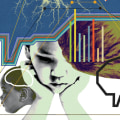Addiction is a negative feedback cycle, where an individual's substance abuse increases without providing the desired effect. This is in contrast to a positive feedback cycle, which can occur when a person becomes dependent on a substance. For example, when drinking alcohol, the blood alcohol level rises rapidly and can be a pleasant experience. Reinforcement is the repetition of a habit based on a relationship with a stimulus and can be either positive or negative.
Positive reinforcement increases drug use by providing an external stimulus that increases the desired effect or eliminates an aversive stimulus. Negative reinforcement also increases drug use by providing an external stimulus that eliminates an aversive stimulus. Both types of reinforcement maintain the behavior of drug use, regardless of whether it is positive or negative. Jordan Peterson argues that it is these positive feedback systems that are at play when it comes to mental illness and addictions.
He uses the example of alcohol addiction to illustrate this point. To create positive feedback, one can engage with others and inform them of successes, as well as set rewards for oneself. Mindfulness is another way to generate positive feedback. Positive feedback circuits also exist, but are generally associated with illness or change, such as drug addiction.






